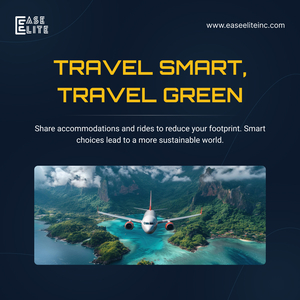Eco-Friendly Travel Matching: AI-Driven Pairing for Sustainable Travel
Introduction
In a world where sustainability is becoming a priority, the travel industry is evolving to reduce its carbon footprint. Traditional travel methods often lead to excessive emissions, wasted resources, and inefficient transportation. Eco-friendly travel matching is revolutionizing the way people move by utilizing AI-powered pairing systems to match travelers for shared rides and accommodations. This innovative approach not only makes travel more affordable but also contributes to a more sustainable planet.
The Need for Sustainable Travel
The tourism industry contributes to nearly 8% of global carbon emissions, with transportation being a major culprit. Flights, taxis, and single-passenger car rides significantly increase greenhouse gas emissions. Shared travel solutions powered by artificial intelligence (AI) are emerging as a game-changer, allowing travelers to minimize their environmental impact while enjoying cost-effective, hassle-free travel.
How AI-Powered Travel Matching Works
AI technology has transformed the way we connect with fellow travelers. Here’s how AI-driven pairing systems help promote sustainable travel:
1. Smart Ride-Sharing Optimization
- AI analyzes travel routes, user preferences, and schedules to match travelers heading in the same direction.
- Carpooling services use real-time data to optimize routes, reduce detours, and ensure fuel efficiency.
- Platforms like BlaBlaCar and EaseElite match users based on location proximity and ride preferences.
2. Sustainable Accommodation Matching
- AI-powered booking systems pair travelers with compatible roommates for shared accommodations.
- Travelers staying in the same city can split hotel or rental home costs, reducing both expenses and energy consumption.
- Platforms such as Couchsurfing and Airbnb’s shared stays promote a sustainable lodging approach.
3. Reducing Travel Redundancy
- Many travelers unknowingly book separate taxis or accommodations for similar destinations. AI detects these overlaps and suggests shared alternatives.
- By consolidating bookings, AI helps reduce the number of vehicles on the road, lowering overall emissions.
4. Personalized Sustainability Preferences
- AI considers factors like carbon footprint goals, travel preferences, and lifestyle habits before suggesting travel companions.
- Users can prioritize eco-friendly transportation options such as electric carpooling, train-sharing, or cycling tours.
Benefits of Eco-Friendly Travel Matching
1. Lower Carbon Emissions
- Fewer vehicles on the road result in reduced air pollution and lower greenhouse gas emissions.
- Shared accommodations cut down energy and resource consumption compared to separate hotel stays.
2. Cost Savings for Travelers
- Ride-sharing and accommodation-splitting reduce travel expenses, making trips more budget-friendly.
- Group bookings and shared costs help travelers afford premium services at lower prices.
3. Enhanced Social Connections
- Matching systems connect travelers with like-minded individuals, fostering new friendships and networking opportunities.
- AI can pair people based on language, culture, and travel preferences, enhancing social compatibility.
4. Increased Safety and Convenience
- AI ensures verified and trustworthy travel companion matching.
- Real-time monitoring and tracking features enhance security during shared rides and stays.
5. Encouragement of Responsible Tourism
- Travelers become more aware of their environmental impact and make conscious choices to reduce waste.
- Local communities benefit from sustainable travel practices, supporting eco-tourism initiatives.
Latest Technologies Powering Sustainable Travel Matching
The integration of AI, blockchain, and IoT (Internet of Things) has transformed travel matching into a more efficient and secure process.
1. AI-Powered Recommendation Engines
- Machine learning algorithms analyze user behavior and suggest eco-friendly travel options.
- AI constantly refines its recommendations based on traveler feedback and real-time availability of shared rides and stays.
2. Blockchain for Secure Transactions
- Blockchain technology verifies traveler identities and secures ride-sharing transactions.
- Smart contracts automate payment systems for split fares and accommodation-sharing.
3. IoT-Enabled Smart Travel Devices
- IoT sensors in rental cars and hotels track energy consumption and carbon footprints.
- AI integrates IoT data to suggest energy-efficient lodging and transportation options.
Use Cases of Eco-Friendly Travel Matching
1. Business Travel Optimization
- Corporate employees traveling for work can be paired for shared accommodations to cut costs and emissions.
- Companies are incentivizing sustainable travel through eco-friendly policies.
2. Solo Traveler Safety & Budgeting
- Solo travelers looking for safe and affordable travel options can be matched with verified co-travelers.
- Women travelers benefit from AI’s secure and background-checked companion pairing.
3. Event-Based Group Travel
- Attendees of concerts, sports events, and festivals can share transport and lodging.
- AI suggests shared travel plans to optimize logistics and reduce congestion.
4. Family & Elderly-Friendly Travel
- Families and elderly travelers receive personalized pairing suggestions based on comfort and accessibility needs.
- AI matches users with companion travelers experienced in assisting seniors.
Challenges & Disadvantages of AI-Powered Travel Matching
Despite its advantages, AI-driven travel matching has certain challenges:
1. Privacy Concerns
- Travelers may be hesitant to share personal data for AI-based matching.
- Strong data encryption and blockchain integration help enhance security and trust.
2. Compatibility Issues
- Not all travelers have identical preferences and expectations.
- AI fine-tunes pairing algorithms through user feedback and preference-based filtering.
3. Limited Availability in Remote Areas
- AI-powered services may be less effective in rural or underdeveloped regions.
- Expanding IoT and 5G infrastructure can help improve access to smart travel matching solutions.
The Future of Sustainable Travel with AI
As AI-driven travel solutions continue to evolve, we can expect:
- Hyper-personalized travel experiences, where AI curates entire trips based on eco-friendly preferences.
- Expansion of blockchain-based verification for secure and trustworthy travel companion matching.
- Increased adoption of electric and hybrid ride-sharing options.
- Integration of smart city infrastructure for seamless travel planning.
Conclusion
Eco-friendly travel matching powered by AI is redefining how we explore the world. By promoting shared rides, sustainable accommodations, and personalized companion pairing, AI is making travel more affordable, socially engaging, and environmentally responsible. As technology continues to advance, AI-driven travel solutions will play a pivotal role in reducing carbon footprints and encouraging responsible tourism.
Are you ready to travel smarter and greener? Platforms like EaseElite and other AI-powered travel services are here to make your journeys both enjoyable and sustainable. 🌍♻️






